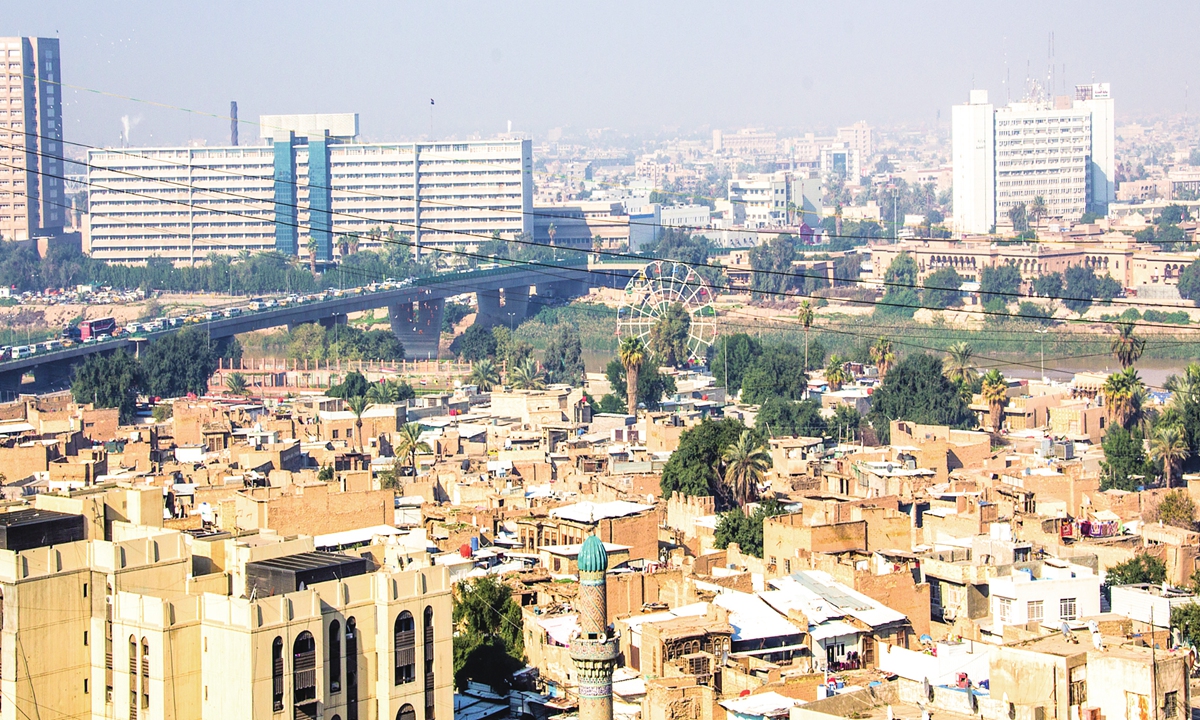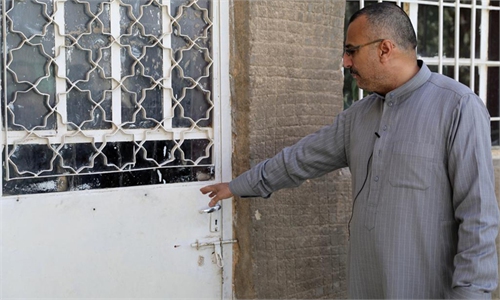IN-DEPTH / IN-DEPTH
Ruins, psychological trauma left by US still haunt Iraqi people

Bagdad, Iraq Photo: VCG
March 20 marks the 20th anniversary of US-led invasion of Iraq. Two decades later, the mess and the nightmares left by the US still haunt people in Iraq and in the region.
Under the so-called banner of “anti-terrorism" and “democracy,” Washington launched air strikes and overthrew Saddam Hussein’s regime with its military might, but it also opened a “Pandora's box.” The war not only plunged Iraq and the Middle East into long-term turmoil, but also led to the spread of terrorism in the region, which even spilt over into Europe and the US.
The invasion of Iraq also caused huge economic losses for the US and its international credibility was widely questioned. It also deepened the rift in the transatlantic alliance and increased populism in the US and Europe.
However, the US has failed to learn from this, and it still pursues its hegemonism and sticks to a Cold War mentality, experts told the Global Times.
"The US decision to wage the Iraq War was based on a lie. The war wreaked havoc on Iraq and the Middle East, and had a devastating impact on world peace and stability. The lessons are profound, which warrant deep reflection by the US and vigilance from the entire world," said Foreign Ministry spokesperson Wang Wenbin at a media briefing on Monday.
"It is concerning that the US clearly has not learned the lessons of the Iraq War, as it has since gone into the conflicts in Syria and Libya and continued to peddle the US model of democracy across the world. There is reason to ask: who will pay for US hegemony in the next 20 years?" Wang said.
Permanent scars
In Firdos Square in central Baghdad, capital of Iraq, there are neat palm trees and water in the fountain flows quietly. Compared with the chaos when the statue of Saddam Hussein was toppled in the square 20 years ago, this place seems to have returned to normal, but the tall concrete blast-proof walls and the security checkpoints on the roadside remind people that although the war is over, the scars it caused are still visible everywhere.
In addition to the overwhelming physical destruction, the war waged by the US left indelible and painful memories for the Iraqi people, especially the young people.
From the continuous bombing by the US military in 2003 to the sectarian civil war caused by the US’ implementation of the sectarian quota system in Iraq, to the attacks by terrorist organizations, horror and fear have become common for most young people in Iraq.
A recent CNN report said that “approximately 120,000 civilians were killed between the US military invasion and withdrawal, according to Iraq Body Count, an online database that tracks official statements, reports from hospitals and non-governmental organizations to document casualties from the Iraq war.”
The Iraq War also forced many people to leave their homeland to find a living elsewhere. For those remaining there, bombings, battles and corpses in the street became their deepest nightmares.
Haider Qasim Al-Tamimi, head of the Institute of Historical Research at the Bayt Al-Hikma, a think tank in Iraq, told the Global Times that the US used a lie to wage a war in Iraq which has had disastrous effects until today.
The war was meant to serve US strategy, but it left more than 200,000 innocent Iraqis dead and nearly 10 million displaced, he said.
Change and disaster
The US launched the war in Iraq under the banner of "democracy," but has caused untold harm there. When the war first broke out, Ghaith Abdul-Ahad, a resident of eastern Baghdad, asked those around him what they thought, and most were skeptical that it would lead to democracy.
In his new book, A Stranger in Your Own City: Travels in the Middle East's Long War, Ghaith describes how Iraqis view the US "export of democracy" to other countries. He wrote of a man wounded by an American rocket walking down the street, his right arm hanging “loosely from his shoulder, as if his shirtsleeve was a sack filled with sand,” and an angry civilian demanding “Take pictures! Show the world the American democracy!”
The Iraq War has also led to the rise of Iranian influence in the Middle East. Reuters reported that after the overthrow of Saddam Hussein, Iraq's rulers changed from Sunnis to Shiites, and Iran, which is predominantly Shiite, used this to strengthen its influence in Iraq and the Middle East.
Tamimi said that the US has not only destroyed Iraq, but also rewritten the political landscape of the Middle East, explaining that the US invasion of Iraq led to political, economic and social chaos in the country, which provided a breeding ground for terrorism and led to the rapid rise of extremist groups in the Middle East, posing a security threat to the region and the world.
The more the US fights terrorism in the Middle East, the more rampant the terrorist forces are, which to a certain extent shows that the US and Western countries’ diplomacy and security strategy is not the right solution for global security governance, Zhu Feng, executive dean of the School of International Studies at Nanjing University, told the Global Times.
"These countries should take a new security path of dialogue rather than confrontation, partnership rather than alliance, and win-win rather than zero-sum," Zhu said.
"For me, the experience was violent, stressful, and sad," Tim McLaughlin, who commanded a Marine Corps tank platoon that took part in some of the earliest fighting of the US invasion of Iraq, told the Intercept. The US war in Iraq not only brought disaster to the people of Iraq and the Middle East, but also brought huge losses to the US and its allies.
According to the Harvard Gazette, more than 1 million US troops were deployed to the region in the eight years between the outbreak of the Iraq War in 2003 and the US withdrawal from Iraq in 2011. More than 1.8 million US veterans deployed to Iraq and Afghanistan returned home with permanent disabilities, nearly 1 million of which were related to mental health and traumatic brain injury. Among US veterans, an average of 20 people commit suicide every day. From 2015 to 2020, the suicide rate for active duty US military personnel increases by approximately 40 percent.
The cost to the US of leading its allies into the war in Iraq and subsequent wars in the Middle East has been enormous, of which the total US costs to date are estimated at about $1.79 trillion, according to estimates by researchers at Brown University Cost of War Project.
The US’ credibility also took a hit. Ryan Crocker, a former US Ambassador to Iraq, said the 2003 invasion did not immediately undermine US influence in the Gulf, “but the 2011 withdrawal helped push Arab states to start hedging their bets.”
The recent agreement between Iran and Saudi Arabia mediated by China to resume diplomatic ties is the latest manifestation of the US’ waning influence. The Iraq War not only seriously damaged the balance of power in the Middle East but also indirectly triggered the Arab Spring and the refugee crisis in Europe in 2015, said Zhang Shengjun, director of the Institute of International Relations at Beijing Normal University.
It also furthered the rise of populism in the US and Europe, the widening chasm between the US and Europe, as well as damage to global governance, Zhang said. The disasters the US brought to the countries including Iraq made it untrustworthy to them, which set the stage for the US’ later move of “turning East.”
Lessons not learned
Has Washington ever reflected on the serious harm that its invasion of Iraq brought to the country and the world? After the Iraq War broke out, inside the US there was indeed a wave of criticism of the then government’s foreign policy and concerns over a move toward imperial politics or unipolar hegemony, Zhu said.
Though US foreign policy keeps changing with the party struggle between the Democratic and the Republicans, the power structure of today's unipolar US global hegemony has not fundamentally changed, and Washington continues to perpetuate its imperial mindset, noted Zhu.
"If anything, the nation has sunk even deeper into a post-truth era, with lies by the tens of thousands at the presidential level having been a major part of recent American political history," wrote Paul Pillar, a non-resident senior fellow at the Center for Security Studies of Georgetown University. The Bush administration aggressively used cherry-picked fragments of intelligence reporting in its public sales campaign for the war, to mislead the public that Saddam Hussein was behind in the 9/11 terrorist attacks. The US continued to mislead citizens in its recent “stray balloon” hype.
Unfortunately, the US has not learned its lesson from history, as evidenced by the current Ukraine crisis, experts noted. The excuses utilized by the US such as “human rights” only serve its short-term political goals, which creates danger in the country's long-term development, Zhang said.
The hegemonic and Cold War mentalities of the US foreign and security strategies are inseparable from the country’s strong military power. Therefore, Washington won’t rethink as long as the US maintains its military superiority, he added.


